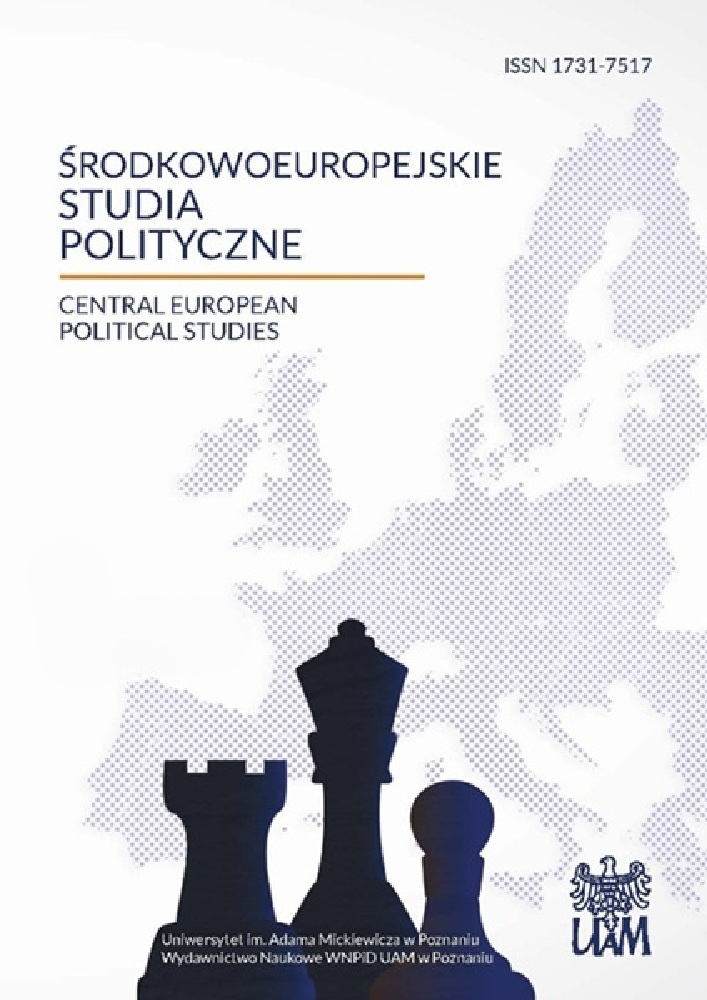Abstract
The aim of the article is to indicate determinants of, so called, city mayors reelection phenomenon by using survey methodology. The article is based on two exit poll surveys’ data, conducted in 2006 (n=1769) and in 2014 (n=1160).The analysis has shown statistically significant relationships between voting for an incumbent and some socio-demographical variables (such as age and socio-economic status), voting motivations (particularly motives of candidates’ accomplishments) and intensity of one of socio-psychological human being feature which is an aversion toward changes. The evidence that voting for reelection correlates with the level of personal political knowledge has not been found.
References
Ansolabehere S., Snyder J. M. Jr., Stewart Ch. (2000), Old Voters, New Voters, and the Personal Vote: Using Redistricting to Measure the Incumbency Advantage, „American Journal of Political Science”, vol. 44, nr 1.
Bartels L. M. (1996), Uninformed Votes: Information Effects in Presidential Elections, „American Journal of Political Science”, vol. 40, nr 1.
Bartnicki S. (2014), Lokalna egzekutywa u progu czwartej kadencji wyborów bezpośrednich. Wnioski z analizy ilościowej, „e-Politicon”, nr 11.
Brender A. (2003), The effect of fiscal performance on local government election results in Israel: 1989–1998, „Journal of Public Economics”, vol. 87, nr 9–10.
Brender A., Drazen A. (2008), How Do Budget Deficits and Economic Growth Affect Reelection Prospects? Evidence from a Large Panel of Countries, „American Economic Review”, vol. 98, nr 5.
Bukowski M., Flis J., Hess A., Szymańska A. (2011), Opcja czy osoba? Upartyjnienie versus personalizacja w wyborach samorządowych, Wydawnictwo Uniwersytetu Jagiellońskiego, Kraków.
Caseette A., Farvaque E. (2014), Are Elections Debt Brakes? Evidence from French Municipalities, „Economics Letters”, vol. 122, nr 2.
Cox G. W., Morgenstern S. (1993), The Increasing Advantage of Incumbency in the U.S. States, „Legislative Studies Quarterly”, vol. 18, nr 4.
Cox G. W., Morgenstern S. (1995), The Incumbency Advantage in Multimember Districts: Evidence from the U.S. States, „Legislative Studies Quarterly”, vol. 20, nr 3.
Eckles D. L., Kam C. D., Maestas Ch. D., Schaffner B. F. (2014), Risk Attitudes and the Incumbency Advantage, „Political Behavior”, vol. 36, nr 4.
Eckles D. L., Schaffner B. F. (2010), Risk Aversion and the Incumbency Advantage, http://people.umass.edu/schaffne/incumbent_riskaversion_final.pdf.
Erikson R. S. (1971), The Advantage of Incumbency in Congressional Elections, „Polity”, vol. 3, nr 3.
Gendźwiłł A. (2008), Dlaczego sukces? Analiza wyników wyborów prezydentów największych polskich miast, w: Studia nad wyborami. Polska 2005–2006, red. J. Raciborski, Wydawnictwo Naukowe Scholar, Warszawa.
Hyneman Ch. S. (1938), Tenure and Turnover of Legislative Personnel, „Annals of the American Academy of Political and Social Science”, nr 195, January.
King G. (1991), Constituency Service and Incumbency Advantage, „British Journal of Political Science”, vol. 21, nr 1.
Kozielecki J. (1986), Erozja władzy: anatomia zjawiska, „Studia Socjologiczne”, nr 2.
Kubisz-Muła Ł. (2013), Badanie exit poll – historia, funkcje i specyfika, „Studia Socjologiczne”, nr 4.
Levitt S. D., Wolfram C. D. (1997), Decomposing the Sources of Incumbency Advantage in the U.S. House, „Legislative Studies Quarterly”, vol. 22, nr 1.
Mann T. E., Wolfinger R. E. (1980), Candidates and Parties in Congressional Elections, „The American Political Science Review”, vol. 74, nr 3.
Mayhew D. R. (1974), Congressional Elections: The Case of the Vanishing Marginals, „Polity”, vol. 6, nr 3.
Piechota G. (2013), Źródła poparcia wyborczego lokalnych liderów w samorządowych kampaniach wyborczych (na przykładzie kampanii wyborczych prezydentów miast na prawach powiatu w 2010 roku), „Środkowoeuropejskie Studia Polityczne”, nr 2.
Rutkowski P. (2008), Klientelizm w perspektywie wyborów samorządowych – studium miasta średniej wielkości. Hipoteza klientystyczna jako próba wyjaśnienia „fenomenu reelekcji”, w: Studia nad wyborami. Polska 2005–2006, red. J. Raciborski, Wydawnictwo Naukowe Scholar, Warszawa.
Sakurai S., Menezes-Filho N. (2008), Fiscal policy and reelection in Brazilian municipalities, „Public Choice”, vol. 137, nr 1–2.
Tybuchowska-Hartlińska K. (2012), Wybory do samorządu terytorialnego w Polsce. Dwadzieścia lat doświadczeń w subregionie ciechanowskim, Europejskie Centrum Edukacyjne, Toruń.
Veiga L. G., Veiga F. J. (2007), Does opportunism pay off?, „Economics Letters”, vol. 96, nr 2.
License
Copyright
© 2016, Uniwersytet im. Adama Mickiewicza w Poznaniu, Wydawnictwo Naukowe Instytutu Nauk Politycznych i Dziennikarstwa
OPEN ACCESS
